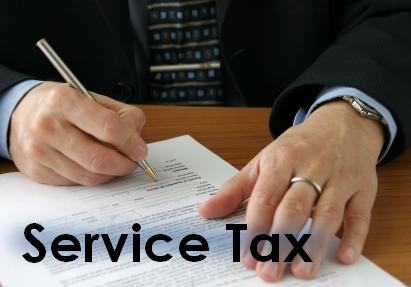It is a general rule that the liability of service tax rests upon the service provider only. However there is exception of some services under reverse charge /joint charge mechanism where the statutory liability is either fully or partially shifted on the service receivers also. Generally, service tax is charged separately in the invoice raised by the service provider in accordance with their terms of agreement. But the dispute arises in those cases where either there is no agreement entered into or the terms of the agreement are silent in respect of payment of service tax or the terms of agreement fixes liability upon the service provider only. In such cases the service receiver always takes the plea that in absence of any specific clause regarding payment of service tax, the service value agreed upon should be considered as inclusive of service tax and thus tax has to be paid by the provider of service only. Apparently, it seems to be logical also because if service tax is not charged separately, the value should be assumed to be inclusive of service tax in terms of the provisions of section 67 of the Finance Act, 1994. Hence the service provider has to pay/bear the service tax liability from the service value itself.
Nowadays, most of the assessee takes input/Cenvat credit under service tax. So, even in absence of specific agreement they do not hesitate to pay service tax separately charged because nothing is going out of their pocket. So they are happily ready to pay service tax charged in the bill.
However, the problem arises especially in those cases where the receiver of the service is person who does not take input or the ultimate consumers of service. So such category of service receiver always oppose if service tax not specifically agreed upon is charged in the bills raised by the provider of service. This is the point where dispute starts between service provider and receiver. This type of dispute crept in majority when the levy of service tax on ‘Renting of Immovable property’ was started in the year 2007. In most of the cases, the existing rent agreements have no clause about the service tax and in the absence of such clause, it was not easy for landlords to recover service tax from the tenants. However, in cases where the rent agreement has a clause like “all future tax liability arising out of this agreement will be paid by the tenant”, the landlords may be successful in recovering service tax from the tenants. The landlords being a service provider are liable to pay service tax to the Government under the service tax laws. The landlords are also required to be registered with the Service Tax department. The demand of service tax will be issued by the service tax department on the landlord. Even if a tenant does not reimburse service tax to the landlord, the landlord will have to pay service tax on his own. It cannot be an excuse for not paying service tax that the tenant has not paid the service tax component to landlord. The only remedy available to landlords is to file a suit for recovery of service tax from the tenants. Many a times, the judiciary was put to test to examine this matter. So let us understand it from the support of multiple case laws.
The Delhi High court had an occasion to deal one such issue in case of Pearey Lal Bhawan Association Vs. Satya Developers (P.) Ltd. [2011] 31 STT 51 (Delhi) wherein the plaintiff- society was owner of a building Pearey Lal Bhawan. The plaintiff entered into a lease deed with the defendant in respect of an area. The parties also entered into an agreement for maintenance of common services and facilities in respect of the leased premises. With effect from 1-6-2007 the Central Government, by amending Chapter V of the Finance Act, 1994, levied service tax on the renting of immovable property for business purposes.
On filing a suit, the plaintiff contended that the levy of service tax is in the nature of an indirect tax, which has to be deposited by the service provider, after collecting the same from the user of the service, i.e., the lessee-defendant, in the instant case.
The defendant, on the other hand, denied the suit claim pointing out to the relevant clauses of the lease deed, which read that the lessor would continue to pay all or any taxes, levies or charges, rates, ground rent, house-tax charges, fire-fighting tax, easements and outgoing charges imposed by the Government, Local Authority, etc.
It was held by the Court that :
- The parties did not visualize that this kind of levy would be made in respect of a lease, or rental of commercial properties. It was also undisputed that the levy was made effective in 2007, after the parties had entered into the agreement. [Para 12]
- The Supreme Court in All India Federation of Tax Practitioners v. Union of India [2007] 10 STT 166, has held that service tax is an indirect tax levied on certain services provided by certain categories of persons including companies, associations, firms, body of individuals, etc. It was further held that sales tax and service tax are consumption specific duties which do not constitute a charge on the business but on the client. [Para 13]
- Sections 12A and 12B of the Central Excise Act, which are also made applicable by virtue of section 83 of the Service Tax Act, prescribe that the provider of goods (in the instant case, service) has the obligation to indicate the quantum of tax, on the goods or services, sold or offered for sale. [Para 13]
- It was true that the contracts entered into between the parties in the instant case, spoke of the plaintiff-lessor’s liability to pay municipal, local and other taxes, in at least two places. Service tax is a species of levy which the parties clearly did not envisage while entering into their arrangement. Leasing and renting premises were included as a ‘service’ and made exigible to service tax, by an amendment. If the overall objective of the levy – as explained by the Supreme Court, was to be taken into consideration, it is the service which is taxed, and the levy is an indirect one, which necessarily means that the user has to bear it. The rationale why this logic has to be accepted is that the ultimate consumers have contacts with the users; it is from them that the levy would eventually be realized, by including the amount of tax in the cost of the service (or goods). [Para 14]
- Further, section 64A of the Sales of Goods Act, 1930 clearly says that unless a different intention appears from the terms of the contract, in case of the imposition or increase in the tax after the making of a contract, the party shall be entitled to be paid such tax or such increase. Although there is no explicit provision to that effect, enabling lessors such as the plaintiff, to the service tax component, there is sufficient internal indication in the Act through section 83, read with section 12A and section 12B suggesting that the levy is an indirect tax, which can be collected from the user (in this case, the lessee). [Para 15].
This issue, was, therefore, answered in the plaintiff’s (Landlord) favour and against the defendant tenant.
Similarly, in case of Kishore K.S. Vs. Cherthala Municipality [2012] 18 taxmann.com 41 (Ker.) thepetitioners have taken rooms on rent from the respondent Municipality. They have been called upon to pay service tax. It is their case that the demand for service tax is illegal.
The Honb’le Kerala High Court held that :
- Service tax can be passed on by the service provider. The service tax is clearly an indirect tax. It is open to the Legislature even if it is an indirect tax to provide that it shall not be passed onto the consumer. There is no such prohibition in the matter of service tax. That apart, the High Court in other decisions specifically declared that service tax can be passed on by the service provider. Therefore, there is no merit in the contention that service tax cannot be passed on by the municipality to the tenants. [Para 7]
- The second question is whether in the absence of the contract, it is open to the municipality to pass it on. The tax is primarily on the service provider. As already noted, it does prevent passing on of the tax to the tenants. A statutory right exists in favour of the municipality to pass it on as already noted. It is open to the municipality to decide not to pass on the burden. But, when the municipality elects to demand the payment of tax, it may not be open to the petitioner particularly in a writ jurisdiction to pointed out that it is in violation of the contract to demand payment of service tax. There was no merit in the said contention and it is rejected. [Para 8]
In view of this, writ petitions fail and dismissed and thus the case gone in favour of landlord municipality only.
In one case of Swapan Kumar Paul Vs. Oil & Natural Gas Corporation [2008] 17 VST 332 ( GUWAHATI ) the Agartala Bench of Hon’ble Gauhati High Court held that service provider has only limited liability of collecting service tax and pay it to the department. Hence, ONGC ( service receiver) is liable to make payment of service tax to contractor (service provider).
Author’s comment:
From the discussion above it is observed that the judgments are delivered in favour of the service providers by virtue of application of the provisions contained in Section 12A and 12B of Central Excise and Salt Act 1944 in relation to service tax, there is a statutory presumption that the person paying the service tax has passed on the liability to the recipient of the service. The legislative intent, therefore, is quite clear i.e. the service tax is to be ultimately borne by the recipient of the service, though it is the service provider who is statutorily liable to pay the said tax to the exchequer. Section 83 of the Finance Act read with Sections 12A and 12B of Central Excise and Salt Act, 1944, in my view, gives ample legal right to the service provider to recover the amount of service tax paid by him from the recipient of the service. Had that not been the legislative intent, there would have been no occasion to apply Sections 12A and 12B of Central Excise and Salt Act in relation to service tax.
Similar to Gauhati High Court’s view (supra) , the Allahabad High Court in a more recent case of Bhagwati Security Services (Regd.) Vs. UOI 2013 (31) STR 537 (All.) held that service tax being a statutory liability as statue is imposing tax upon the persons to whom service is being provided and the service provider is merely a collecting agency. Hence, HC directed the reimbursement of service tax to the petitioner.
The author has also noticed a contrary ruling too in case of Brahamputra Infrastructure Vs. Delhi Development Authority(DDA) (2010) 251 ELT 488( Del HC) wherein it was held that once there is no provision for collection of service on basis of written agreement the service provider is not entitled to recover the amount as reimbursement from DDA.
In the case of Raghubir Saran Charitable Trust v. Puma Sports India Pvt. Ltd. 2012(191) DLT 183, an award was passed by the arbitrator requiring the landlord (petitioner before the Court) to bear the liability of all property taxes and other outgoings, including service tax liability. The arbitrator had distinguished the decision of this Court in Pearey Lal Bhawan Association (supra) on the ground that clause 7.1 of the lease deed in that case was worded differently from the relevant clauses of the lease deed in Pearey Lal Bhawan Association (supra.).Therefore it is the contract, and not the nature of the levy, which will determine which party, the service provider or recipient, is liable to bear the burden of service tax. In the present case, the wording of Clause 7.1 of the lease reflects the intention of the parties that it is the Petitioner who would bear the incidence of all taxes.
In author’s opinion the liability of service receiver is not a statutory liability. It is purely contractual in nature. However the Courts may order payment under writ powers, but otherwise service receiver has no statutory liability. Based upon above discussion, it appears that in absence of any contract the nature of levy will determine who will bear the burden of service tax. Further the author is of the opinion that the recovery can be made from other party only to the extent the liability has not become barred by limitation.
*The author is a practicing chartered accountant at Guwahati can be reached at: manoj_nahata2003@yahoo.co.in



